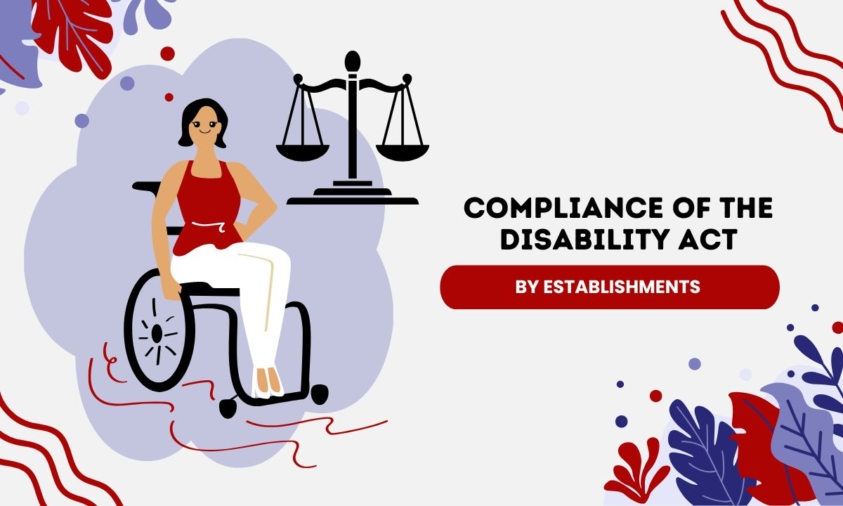Introduction
In a world that aspires for inclusivity and diversity, THE RIGHTS OF PERSONS WITH DISABILITIES ACT, 2016 (“Disability Act 2016”) represents a significant milestone in safeguarding the rights of individuals with disabilities. This landmark legislation was enacted to protect the rights and dignity of persons with disabilities, ensuring their full and equal participation in society. In this blog post, we delve into the key provisions of the Disability Act 2016 and explore how it affects companies and establishments, as well as its implications for creating a more inclusive work environment.
The Disability Act 2016 has a profound impact on establishments (where Section 2(i) of the Disability Act 2016 defines “establishment” as a “Government establishment and private establishment”), as it mandates certain responsibilities and measures to create an inclusive environment for employees, customers, and visitors with disabilities. Here are some key aspects that businesses need to be aware of:
Non-Discrimination in Employment (Section 20):
- Government establishments are prohibited from discriminating against any person with a disability in matters relating to employment.
- Government establishments are required to provide reasonable accommodation and a barrier-free and conducive environment to employees with disabilities.
- No promotion can be denied to a person solely on the grounds of disability.
- An employee who acquires a disability during their service cannot be dispensed with or reduced in rank. If the employee is not suitable for their previous post, they should be shifted to another post with the same pay scale and service benefits. If no suitable post is available, the employee may be kept on a supernumerary post until a suitable one is available or until they reach the age of superannuation.
Equal Opportunity Policy (Section 21):
- Every establishment, including government and private establishments, is required to notify an equal opportunity policy that outlines the measures to be taken to ensure compliance with the provisions of the Act.
- The establishment must register a copy of the policy with the Chief Commissioner or State Commissioner for Persons with Disabilities, as applicable.
Maintenance of Records (Section 22):
- Every establishment, whether government or private, must maintain records related to persons with disabilities in matters of employment, provided facilities, and other necessary information. The specific form and manner of record-keeping are prescribed by the Central Government.
- Employment exchanges are also required to maintain records of persons with disabilities seeking employment.
- These records must be open to inspection by authorized individuals on behalf of the appropriate government during reasonable hours.
RULE 3 of the Rights of Persons with Disabilities Rules, 2017 prohibits establishments from discriminating against individuals with disabilities. Here are the key provisions related to non-discrimination:
- Duty of the Head of the Establishment: The head of the establishment, whether it is a government or private establishment employing twenty or more persons, has the responsibility to ensure that the provisions of Rule3 (3) is not misused to deny any right or benefit to persons with disabilities covered under the Act. This emphasizes the importance of preventing discrimination and ensuring equal treatment.
- Handling Complaints: If the head of the private or government establishment with 20 or more employees receives a complaint from an aggrieved person regarding discrimination on the grounds of disability, he shall initiate action in accordance with the provisions of the Rule: This involves taking appropriate steps to address the complaint and rectify the discriminatory act or omission.
- Disposal of Complaints: If the aggrieved person submits a complaint to the Chief Commissioner or State Commissioner for Persons with Disabilities, the complaint must be disposed of within sixty days. However, in exceptional cases, the Chief Commissioner or State Commissioner has the authority to dispose of the complaint within thirty days. This ensures a timely resolution of discrimination complaints.
- Costs of Reasonable Accommodation: No establishment, regardless of its nature, can compel a person with a disability to partly or fully pay the costs incurred for reasonable accommodation. This provision ensures that the financial burden of providing necessary accommodations does not fall on the individual with a disability, promoting equality and accessibility.
By enacting these provisions, the Disability Act 2016 aims to prevent discrimination based on disability and ensure that individuals with disabilities are not denied their rights and benefits. It emphasizes the importance of taking prompt action to address complaints and promoting an inclusive and accommodating environment for persons with disabilities.
Conclusion
The provisions outlined in the Rights of Persons with Disabilities Act, 2016 ensure that establishments do not discriminate against persons with disabilities and are held accountable for their actions. By enforcing non-discrimination measures and requiring the publication of equal opportunity policies, the Act aims to create an inclusive society where individuals with disabilities have equal access to opportunities, facilities, and amenities in the workplace. Compliance with these provisions not only promotes legal adherence but also contributes to a more inclusive and diverse work environment.


 Cart is empty
Cart is empty 
